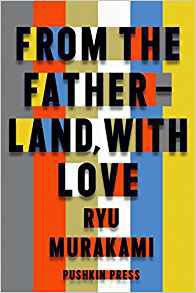From the Fatherland, With Love by Ryū Murakami (Transl. Ralph McCarthy, Charles De Wolf, Ginny Tapley Takemori)
(Pushkin Press, 2013)
Reviewed by Andrew Douglas Sokulski
From the Fatherland, With Love is an exhilarating, poetic, tearful, shocking, thrilling, and intensely realistic novel that focuses on what could occur if a force from North Korea were to invade Japan. At over 600 pages, the book provides immense detail on every aspect of both the North Korean and Japanese sides, while conveying the complexity of the associations between humanity, loyalty, individuality and community.
Ryū Murakami chooses not to portray North Korean as a heartless, vicious people, but as people who have been put through painful training and who carry severe, harsh experiences from their past.
From a simple story about a man’s relationship with a boomerang, to stories of characters who struggle with family or the staleness of society, the author detects a ray of brightness shining through each character’s individual and shared life experiences. Despite the caustic differences between major character groups, there also lie intimate similarities. Murakami does a stellar job at conveying to the reader that at the end of all discussions or disputes, greetings and partings, we are, at the most foundational level, all part of humanity.
Murakami writes with a captivating prose that clearly links each small story with another to create a magnificently beautiful entirety. From time to time, his exhilarating poetic sense not only rhymes powerful points together, but at intervals, matches one’s own heart beat. As the reader’s eyes follow the words he or she can feel the beauty and excitement: a wondrous tension of both clarity and shock.
In one stand-out scene is a Korean officer decides to pull his gun on himself rather than be captured. Murakami writes: “With a groan he reached toward his chest, looking for the button on the pocket. He found it and wrapped the thread around his index finger. He was about to pull it, when a strange image floated up in his mind. It was of the dog inside the gate at the house of the felon Maezono. A black dog with shiny fur and an elegant, slender face, its legs and body sleek and supple. Why was he thinking of it now? Such a beautiful animal. Choi pulled on the thread with all his might.”
 Murakami elaborates how a small group of Koreans took over the entire city of Fukuoka with such finesse, they were deemed impossible to usurp. The Japanese government, despite working long hours and ruminating tirelessly over strategies, could not come up with a successful plan to retake the city.
Murakami elaborates how a small group of Koreans took over the entire city of Fukuoka with such finesse, they were deemed impossible to usurp. The Japanese government, despite working long hours and ruminating tirelessly over strategies, could not come up with a successful plan to retake the city.
Known as a writer who supports underground, under-represented aspects of society, Murakami proves again that those given the least amount of spotlight know best the strengths and weaknesses of others.
“From The Fatherland, With Love” is a lovely, intimate read that both broadens and deepens the reader’s perspective on the different classes, sectors and levels of society that divide our world. Read an excerpt!

